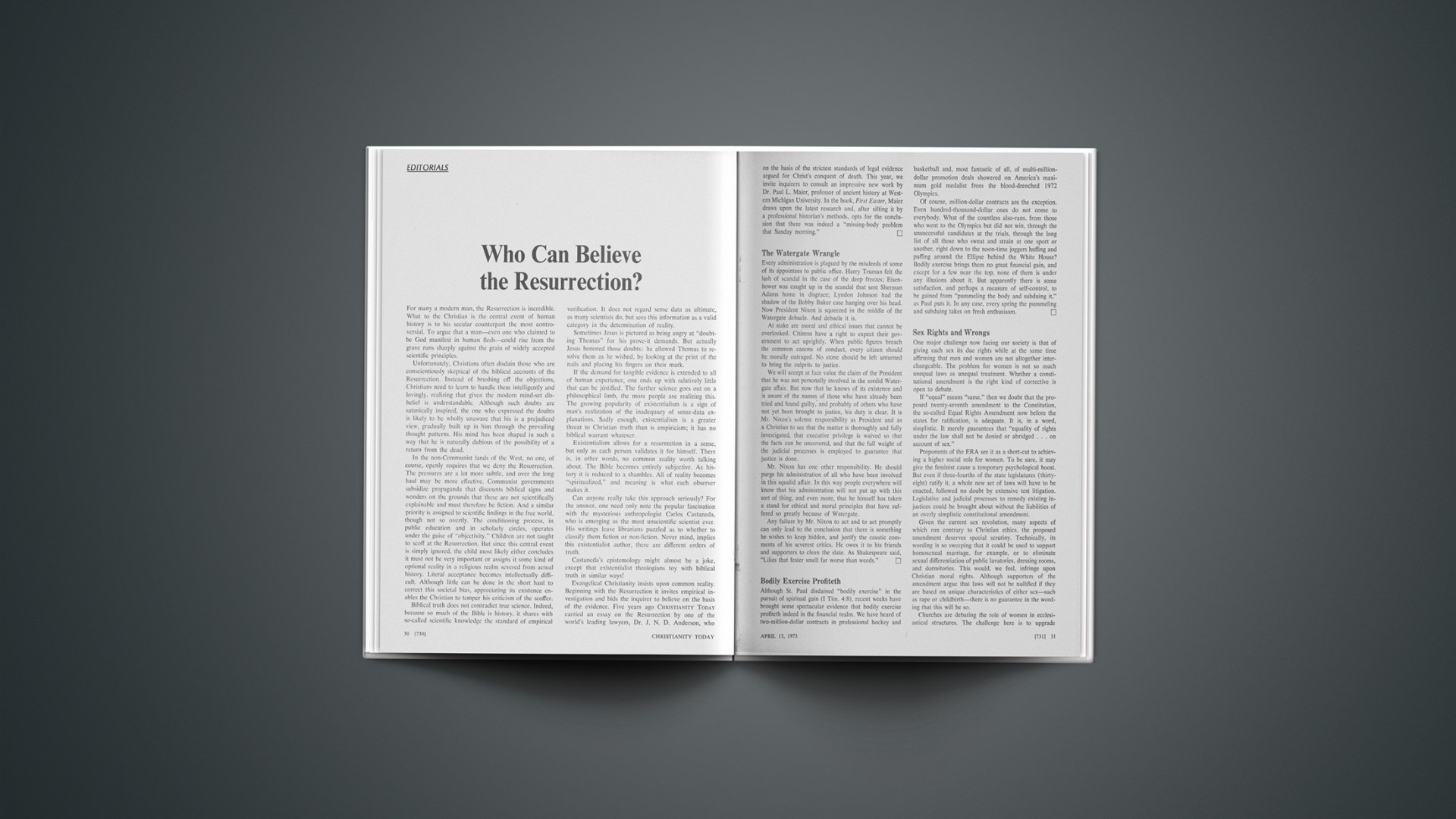For many a modern man, the Resurrection is incredible. What to the Christian is the central event of human history is to his secular counterpart the most controversial. To argue that a man—even one who claimed to be God manifest in human flesh—could rise from the grave runs sharply against the grain of widely accepted scientific principles.
Unfortunately, Christians often disdain those who are conscientiously skeptical of the biblical accounts of the Resurrection. Instead of brushing off the objections, Christians need to learn to handle them intelligently and lovingly, realizing that given the modern mind-set disbelief is understandable. Although such doubts are satanically inspired, the one who expressed the doubts is likely to be wholly unaware that his is a prejudiced view, gradually built up in him through the prevailing thought patterns. His mind has been shaped in such a way that he is naturally dubious of the possibility of a return from the dead.
In the non-Communist lands of the West, no one, of course, openly requires that we deny the Resurrection. The pressures are a lot more subtle, and over the long haul may be more effective. Communist governments subsidize propaganda that discounts biblical signs and wonders on the grounds that these are not scientifically explainable and must therefore be fiction. And a similar priority is assigned to scientific findings in the free world, though not so overtly. The conditioning process, in public education and in scholarly circles, operates under the guise of “objectivity.” Children are not taught to scoff at the Resurrection. But since this central event is simply ignored, the child most likely either concludes it must not be very important or assigns it some kind of optional reality in a religious realm severed from actual history. Literal acceptance becomes intellectually difficult. Although little can be done in the short haul to correct this societal bias, appreciating its existence enables the Christian to temper his criticism of the scoffer.
Biblical truth does not contradict true science. Indeed, because so much of the Bible is history, it shares with so-called scientific knowledge the standard of empirical verification. It does not regard sense data as ultimate, as many scientists do, but sees this information as a valid category in the determination of reality.
Sometimes Jesus is pictured as being angry at “doubting Thomas” for his prove-it demands. But actually Jesus honored those doubts: he allowed Thomas to resolve them as he wished, by looking at the print of the nails and placing his fingers on their mark.
If the demand for tangible evidence is extended to all of human experience, one ends up with relatively little that can be justified. The further science goes out on a philosophical limb, the more people are realizing this. The growing popularity of existentialism is a sign of man’s realization of the inadequacy of sense-data explanations. Sadly enough, existentialism is a greater threat to Christian truth than is empiricism; it has no biblical warrant whatever.
Existentialism allows for a resurrection in a sense, but only as each person validates it for himself. There is, in other words, no common reality worth talking about. The Bible becomes entirely subjective. As history it is reduced to a shambles. All of reality becomes “spiritualized,” and meaning is what each observer makes it.
Can anyone really take this approach seriously? For the answer, one need only note the popular fascination with the mysterious anthropologist Carlos Castaneda, who is emerging as the most unscientific scientist ever. His writings leave librarians puzzled as to whether to classify them fiction or non-fiction. Never mind, implies this existentialist author, there are different orders of truth.
Castaneda’s epistemology might almost be a joke, except that existentialist theologians toy with biblical truth in similar ways!
Evangelical Christianity insists upon common reality. Beginning with the Resurrection it invites empirical investigation and bids the inquirer to believe on the basis of the evidence. Five years ago CHRISTIANITY TODAY carried an essay on the Resurrection by one of the world’s leading lawyers, Dr. J. N. D. Anderson, who on the basis of the strictest standards of legal evidence argued for Christ’s conquest of death. This year, we invite inquirers to consult an impressive new work by Dr. Paul L. Maier, professor of ancient history at Western Michigan University. In the book, First Easter, Maier draws upon the latest research and, after sifting it by a professional historian’s methods, opts for the conclusion that there was indeed a “missing-body problem that Sunday morning.”










